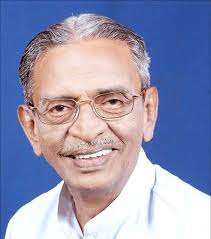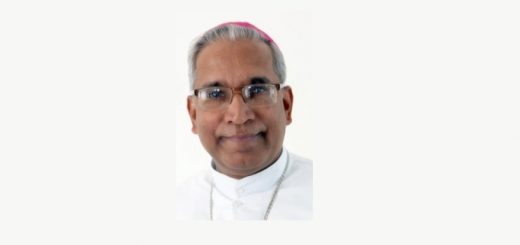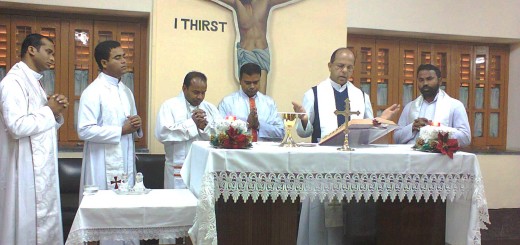Pope: Sex Summit a “Failure” Bishop Schneider gets Papal Views on Clericalism and Homosexuality


Diane Montagna
LIFESITE NEWS
7 March 2019
Bishop Schneider wins clarification on “diversity of religions” from Pope Francis, brands abuse summit a “failure”
Note: We started a very serious discussion, March 4th in CCV on Homosexuality and Clericalism: whether they are opposed to each other and whether they were the main causes of Clerical Sex-abuse, so wide-spread in the Catholic Church.
It looks today we have the answer from the Pope himself, from the hourse’s mouth, as explained in Bishop Schneider from Kazakhstan interview below. He was in Rome with ten other bishops from his region for their ad limina visit and Francis volunteered to discuss both the topics at length for two hours.
Clericalism & Homosexuality
What was the sum total of the discussion? Clericalism is the arrogant attitude of the clerics who want to live their posh, comfortable, showy way of life including sexual pleasures as their birth right; and Homosexuality as the most preferred or available pass time.
There is even a Gay lobby in the Vatican, which Francis admitted and made that famous sympathetic comment: “Who am to judge.” This powerful “Gay lobby” today is protecting and promoting homosexuality by preventing any sort of open discussion on it, nay presenting it as “Sin-neutral” and get away with it as a new façade of holiness.
Even we have heard several times Francis comforting young ‘homosexuals’ saying: “If God has made you so, don’t worry about it!”. Being attracted to a man or woman is as good as being a “right-hander or left-hander”, some come with the rational. So we have today spokspersons and promoters of homosexuality, with many cardinals as their patrons.
Unnatural & wrong
But we have come to the conclusion on the basis of the interview, that homosexuality is unnatural and wrong; of course we could still be wrong, (you may still discuss, intrinsically or exstringly), and no one with homosexual tendencies should be permitted into the priesthood.
That is the Pope’s opinion reported through Bishop Bishop Schneider: “The deepest reason, in my opinion, is that there are mighty clerical clans among bishops and cardinals who want to promote and change in the Church the divine moral law on the intrinsic evil of homosexual acts and of the homosexual lifestyle.”
Our weakness
The one weakness of this report is that, here the readers are not listening to the voice of Francis directly, but to Bishop Schneider reporting what he heard from the Pope. So please read carefully the whole report and make your own conclusion.
Destroy Hierarchical Structure!
Five years ago when Catholic Church Reform International (CCRI) was trying to penetrate into India, I had suggested: “First destroy lock, stock and barrel the top heavy mammoth concrete hierarchical structure of perks, privileges and pomp and dump it in the Arabian sea. With it and the clergy- laity divide, nothing can be done to reform it.
In spite of Pope
“The Pope may place himself one step below the laity to deserve the title: “Servant of Servants”; but the rest may find him as a heavenly eternal papal cusion to sleep on like Kumbakarnan. With the hierarchy and the sharp clery-laity divide nothing can be done to reform it unless all opt to become the classless, castles Cattle class(Mt.23,8-13) caring and sharing like Jesus.” james kottoor, editor CCV.
Read below Interview report on Bishop Schneider
ROME, March 7, 2019 (LifeSiteNews) — In their recent ad limina visit to Rome, the bishops of Kazakhstan and Central Asia raised a number of concerns which have been widely shared in the Church over the last several years, concerning perceived ambiguities in the magisterium of Pope Francis.
In an exclusive interview with LifeSite, Bishop Schneider said the concerns raised during the two-hour meeting with the Holy Father included “Communion for divorced and civilly ‘remarried’ Catholics, the issue of Communion for Protestant spouses in mixed marriages, and the issue of the practical spread of homosexuality in the Church.”
Schneider branded the sex abuse summit a “clerical show” and a “failure” for not addressing the “deep roots” of the crisis and issuing “very precise, compelling and incisive norms.” He expounds on what he believes are the four causes of the abuse crisis and proposes two concrete norms he believes should have come out of the summit.
Here below is our exclusive interview with Bishop Athanasius Schneider.
LifeSite: Your Excellency, what can you tell us about your recent ad limina visit and meeting with Pope Francis?
Bishop Schneider: Regarding our meeting with the Pope, he is the Vicar of Christ on earth in this time, and he was very fraternal and kind to us. It was a very kind atmosphere.
Our meeting with him lasted two hours. I consider this an act of great generosity on the part of the Pope, to spend so much time with our group of 10 bishops and ordinaries of Kazakhstan and Central Asia.
During the meeting, the Pope invited us to freely express our concerns and even our criticisms. He stressed that he likes a very free conversation.
Here CCV confine itself with what was discussed on Vatican sex summit and Pope’s views on clericalism, homosexuality and the question of admitting persons with homosexual tendencies for priesthood,
Vatican sex abuse summit
LifeSite: Many people, including victims of sexual abuse who had come to Rome for the February 25-27 Vatican summit on the protection of minors in the Church, were disappointed with the meeting for what they considered its lack of concrete action. Your Excellency, what do you believe would be the most effective way to solve the problem of sexual abuse and coverup in the Church?
Bishop Schneider: When there is a huge problem — which the abuse of children, minors and adult subordinates by the clergy certainly is — we always have to go to the deepest root, as every good doctor and physician does.
We cannot resolve a sickness only by making a superficial diagnosis. A deep and integral diagnosis is needed. And in my opinion, this was not done at the summit, because one of the evident, observable and deepest roots of the sexual abuse of minors is homosexuality among the clergy. Of course, I will not say that all homosexuals are necessarily abusing children. This would be unjust and untrue. But we are speaking about clerical abuse in the Church, and so we have to focus on this illness. It has been proven that more than 80 percent of victims were post-pubescent males. It is therefore evident that the nature of the majority of this abuse involved homosexual acts. We have to stress that this is one of the main roots.
The other main root of the abuse crisis is the relativism on moral teaching which began after the Second Vatican Council. Since then, we have been living in a deep crisis of doctrinal relativism, not only of dogmatics but also of morals — the moral law of God. Morals were not taught clearly in seminaries over the past 50 years; it was often not clearly taught in Seminaries and Theological faculties that a sin against the sixth commandment is a grave sin. Subjectively there may be mitigating circumstances, but objectively it is a grave sin. Every sexual act outside a valid matrimony is against the will of God. It offends God and is a serious sin, a mortal sin. This teaching was so relativized. And this is one of the other deep roots. We have to stress this. And in my opinion, this was not stressed at the summit: the relativism of moral teaching, specifically on the sixth commandment.
Another deep cause is the lack of a true, serious and authentic formation of seminarians. There was a lack of asceticism in the life and formation of seminarians. It has been proven by two thousand years, and by human nature, that without physical asceticism like fasting, praying, and even other forms of corporal mortifications, it is impossible to live a constant life in virtue without mortal sin. Due to the deep wound of original sin and the concupiscence still at work in every human being, we need corporal mortification.
St. Paul says: “Make no provision for the flesh, to gratify its desires.” (Rom. 13:14) We can paraphrase these words, saying: do not nurture your flesh too much or concupiscence will dominate you. And this is exactly what often happened in seminaries. Seminarians and priests nurtured the flesh through a comfortable life without asceticism, without fasting and other bodily and spiritual mortifications.
But to me, the deepest cause of the clerical sex abuse crisis is the lack of a deep and personal relationship with Jesus Christ. When a seminarian or a priest does not have a deep personal relationship with Jesus Christ, in constant fidelity to a life of prayer and really enjoying a personal love for Jesus, he is easy prey for the temptations of the flesh and other vices.
Furthermore, when you have a deep and personal love of Christ, you cannot deliberately commit a horrendous sin. Occasionally, because of the weakness of human nature, a priest or seminarian could commit a mortal sin against purity. But in the same moment, he is deeply repentant and decides to avoid the next sin at any cost. This is a manifestation of a true love of Christ. But it is for me completely excluded that a person who deeply loves Christ can sexually abuse minors. It is for me impossible. To my opinion, a deep love of Christ excludes this.
These are the main roots: homosexuality among the clergy, relativism of doctrine, a lack of ascesis and above all the absences of a deep and true love for Christ. And this was not stressed in the summit. Therefore, I consider the summit to be a failure, as a doctor fails to cure an illness when he fails to address its causes. This problem will break out again.
LifeSite: You mentioned the statistic that 80 percent of victims were post-pubescent males. How do you respond to Cardinal Blase Cupich and others who point to the John Jay report and other studies as evidence there is no causal relationship between homosexuality and clerical sex abuse?
Bishop Schneider: It’s a denial of reality. How can I speak with a man who denies reality? This is only explainable as an ideological position.
LifeSite: What concrete measures do you believe the summit should have taken to offer real solutions to the problem of clerical sexual abuse?
Bishop Schneider: The summit should have issued concrete canonical norms, but it didn’t, and therefore I think the summit was a failure. It was a beautiful clerical show, it was a show of clericalism— all the clerics with their titles came from all over the world. And many beautiful words — very emotional words — were spoken. But these deep roots were not addressed, and concrete and incisive norms were not given.
To my mind, very precise, compelling and incisive norms should be given.
The first canonical norm I would propose is this: that people with homosexual inclinations should categorically not be accepted in seminaries. And if they are discovered, of course with respect and love, they must be dismissed from the seminary and helped to be healed and to live as a good Christian layman.
Currently the norms only say that those with “deep-seated homosexual tendencies” should not be admitted to seminary, but for me this is not sufficient. What does “deep-seated” mean? If an adult man comes to the seminary and feels homosexual attraction, even if it is not yet deep-seated, it is still a homosexual attraction. And in itself it is already a condition that, in some circumstances — such as in the exclusively male atmosphere of a seminary — could develop into a deeper or more aggressive tendency.
And when he becomes a priest, he will be with seminarians, with young altar boys and so on. And so while perhaps in seminary these tendencies were not deep-seated, they can become deeper in certain circumstances.
It is for me in some way disingenuous. Let’s say that a young man is not an aggressive homosexual. He does not take pleasure in having homosexual tendencies, and they are not so deeply rooted. But when he acknowledges that he has these tendencies, or when it is proven by exterior acts or signs that he has homosexual tendencies, even if they are not deep-seated, he should be charitably sent away from the seminary. And this should be a canonical norm: that someone who acknowledges that he has homosexual tendencies, even not deep-seated, cannot be received into another seminary and cannot be ordained.
Homosexual tendencies are a kind of a personality disorder trait and a distorted perception of reality, since this signifies a desiring an object of pleasure against the natural order of the sexes. Magisterial documents call it an “objective” disorder. How can you ordain a man with a disorder in his personality or in his psycho-somatic makeup? Of course, there are other psychological disorders as well. We do not ordain men with certain psychological disorders, even when they are not so deep. It would harm the priesthood.
LifeSite: You mentioned exterior signs. In the canonical norm you propose, what sort of exterior signs do you have in mind?
Bishop Schneider: If he were to have an exclusive and ostentatious friendship with a man, it would already be an exterior sign. Or if he looks at male pornography on the internet, this would be another sign. These are exterior, verifiable signs. Once these are discovered, such a seminarian should be forever excluded from ordination. Yes, he can be healed, but the seminary is not a sanitarium for healing people with psychological disorders or homosexual tendencies. This is naïve, and it will harm the priesthood and the person. It would be better for such a person to be a good Christian in the world and save his soul, and not to be a priest. We can and should help him, or course. But we have to be willing to say to him: you will not be ordained, it is for the salvation of your soul. Be a good Christian in the world.
Better to have fewer priests but healthy, psychologically healthy men. And deep lovers of Christ, deeply spiritual men. It would be better for the entire Church. Better to leave some parishes without a priest and some dioceses without a bishop for several years than to ordain a man who has a disorder, either homosexual or other personality disorders.
LifeSite: What other concrete norms do you believe the Vatican sex abuse summit should have issued?
Bishop Schneider: In a case when a priest or a bishop commits sexual abuse, even one case, he has to be dismissed from the clerical state. There should be “zero-tolerance” in this case, and it should be established in Canon Law. There should be no exception. Of course, the fact of the sexual abuse must be proven and verified by a true canonical process, but when it is, he has to be dismissed from the clerical state.
These two norms (the categorical non-admittance to the seminary and to ordination of men with homosexual tendencies, and the dismissal from the clerical state), in my view, should have been explicitly mentioned in the summit, if it is to have a concrete impact. Otherwise it was a beautiful meeting, but more or less a clerical show with sentimental words and statements.
LifeSite: Should a priest who has abused minors receive any money from the Church?
Bishop Schneider: I think yes. We have to be merciful and should not be cruel. We must always still be human and Christian, and I think the Church should at least temporarily give these clerics who are dismissed financial help – maybe for the first two years.
Open Letter of Cardinals Burke and Brandmüller
LifeSite: Prior to the summit, Cardinal Raymond Burke and Cardinal Walter Brandmüller issued an open letter calling on the bishops attending the summit to end their silence on the moral corruption in the Church and to uphold divine and natural law. How much do you think their open letter was listened to and heeded at the meeting?
Bishop Schneider: I think the letter of the two cardinals was meritorious and very timely, and history will regard it as a truly positive contribution in this very delicate crisis of abuse on the universal level of the Church. It was a beautiful witness, and I believe this letter honored the College of Cardinals.
But I think it was heard more by the simple people than by the clerics: again, clericalism.
LifeSite: Some have suggested that the Vatican sex abuse summit was the greatest example of clericalism.
Bishop Schneider: They failed to listen to the voices of the lay people. The voice of the laity was not heard sufficiently by clerics. Is this not clericalism?
LifeSite: What do you believe explains the obvious and repeated refusal to address the issue of homosexuality at the summit? Some have argued it might be due to a desire to protect homosexual networks within the hierarchy. Others have suggested it comes from bishops being afraid to say anything negative about homosexuality for fear of repercussions from the State.
Bishop Schneider: I think that the first argument does not have considerable weight in the context of the summit. There are homosexual groups, but in this summit it was not decisive, in my opinion.
The second argument which you mentioned does have some weight but was not decisive. Fear on the part of bishops to confront the world is a factor; the fear of the world. Even though they may personally be against homosexuality, they fear a confrontation with the world. Clerical cowardice: again, clericalism.
But the deepest reason, in my opinion, is that there are mighty clerical clans among bishops and cardinals who want to promote and change in the Church the divine moral law on the intrinsic evil of homosexual acts and of the homosexual lifestyle. They want to make homosexuality acceptable as a legitimate variant of sexual life. In my view, this is the deepest and perhaps the decisive reason why they were silent and failed to address this.

















